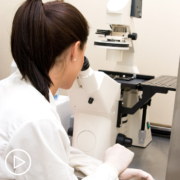Multiple Myeloma Clinical Trials: Which Patients Should Participate? from Patient Empowerment Network on Vimeo.
When is the right time to consider a myeloma clinical trial? Dr. Mark Schroeder discusses when this may be an appropriate myeloma treatment option and shares patient resources for accessing and identifying clinical trials.
Dr. Mark Schroeder is a hematologist at Siteman Cancer Center of Washington University School of Medicine in St. Louis. Dr. Schroeder serves as Associate Professor in the Department of Medicine. Learn more about Dr. Schroeder.
See More from Engaging in Myeloma Treatment Decisions
Related Resources:
Transcript:
Katherine Banwell:
PEN community member, Mark, sent in this question prior to the program, “When is the right time for a clinical trial? When everything else is refractory?”
Dr. Mark Schroeder:
No, I think clinical trials should be – you should engage your oncologist to talk about clinical trials right from the beginning. We typically think about clinical studies – they could be interventional where we’re actually giving a treatment. Some clinical trials are observational where we’re trying to learn about disease course in response to traditional therapies. Either of those may have direct benefit to the patient, or maybe it doesn’t affect the patient, but it affects future patients with myeloma.
There are clinical studies like I mentioned that are moving therapies that are approved, but they’re approved after patients have been treated four or five times for their myeloma, and they’re now being moved earlier in the treatment. Some of those are at the initial treatment of myeloma in that induction phase. And so, we think that maybe by using some of these newer therapies or that immunotherapy class earlier on in the treatment of myeloma could result in deeper responses.
We don’t know if it’s going to result in cures or that long remission beyond five or 10 years, but that’s the hope. If we can move the therapies earlier and prevent the cancer from becoming resistant to multiple treatments, maybe we can lead to longer remissions and longer survival of cancer patients. So, engage with your oncologist from the beginning through all of your treatment lines about clinical trials, is what I would say.
Katherine Banwell:
Well, how can patients find out about clinical trials and what might be right for them? Where should they start?
Dr. Mark Schroeder:
I mean, starting with your physician and having that conversation is a good start, but there are resources for patients. The Multiple Myeloma Research Foundation MMRF has good resources. There is a – called Myeloma Crowd that also has resources for patients with myeloma and social support for patients with myeloma to try to find and match you with a clinical trial. And then if you’re really academic and interested in doing your own homework online, all clinical studies in the United States, even internationally, are registered on a website called clinicaltrials.gov. Clinicaltrials.gov is – it can be searched, so you can search for myeloma; you can search for a specific drug.
That will tell you, where are the studies being done, who are the study personnel, who should I contact to find out about the study? Unfortunately, not everybody can travel for treatment for their myeloma, and the best chance of potentially participating in a research study is to initially talk with your oncologist about it. There may be a larger center nearby that you can visit to consider clinical trials.
Clinical trials that are trying to use the new immunotherapies would be a great option, but they may not be offered in, say, a community oncology practice. You have to have the infrastructure to conduct those studies. And if you have the resources to be able to travel, then finding something on clinicaltrials.gov and – I’ve had patients do the legwork and talk with their local oncologist and get referred to a center that actually has a study that they’re interested in participating.
But a lot of times, studies are going to have you visit the center for all the screening tests and all the procedures for study.
Katherine Banwell:
Right, so you have to know that you have the time available as well as the resources.
Dr. Mark Schroeder:
Right, and the resources to do it. Yeah.
Katherine Banwell:
Yeah. Trevor had this question, Dr. Schroeder, “My myeloma is considered high-risk. What treatment options are available to me, and are there clinical trials specifically for high-risk disease?”
Dr. Mark Schroeder:
Yeah, great question. High-risk myeloma happens in about a quarter of patients, so one in four patients will have high-risk myeloma at the diagnosis. And it’s important because we know that when we say high-risk, that means that the myeloma is going to potentially come back sooner after treatments. It doesn’t mean that the treatment you’re going to be given is less effective, but it has a high propensity to come back sooner.
Those patients with high-risk myeloma still benefit from a lot of treatments that we have for myeloma, but there are clinical trials geared to try and increase treatment in patients with high-risk myeloma to try to change the fact that their cancer comes back sooner than somebody who doesn’t have the high-risk features by using a novel chemotherapies or novel drugs to try to improve responses. So, there are for sure clinical studies, either at – potentially at initial diagnosis or at the time of relapse that could be entertained for patients with high-risk myeloma. And I would encourage you to seek those out for sure.
Katherine Banwell:
Great. Thank you.












